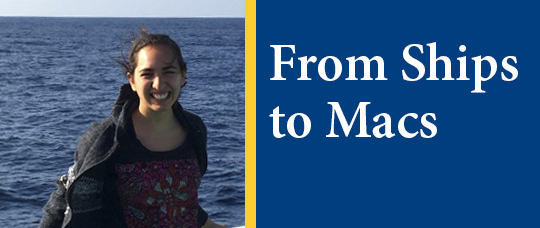Webb first appealed to me because of its practical confluence of math, science, and multi-disciplinary engineering. By the time I graduated in 2010, I was both deeply fascinated by the maritime industry as well as curious about what lay beyond it and what critical knowledge transfer was not making its way into or out of the industry’s scope.
I first explored the industry on a micro scale, simulating ship-wave interactions as a hydrodynamics engineer at Applied Physical Sciences. The problems we attacked were as focused as the vortex generation off a single skeg profile, and the applications of numerical methods and programming were engaging, extending on the math curriculum at Webb. A year later, I had the opportunity to study at MIT with Professor Hank Marcus ‘65 and switched gears to the macro scale, researching oil tanker markets and operations. Gaining a high-level perspective on the self-inflicted, high-risk cyclic nature of global shipping markets was eye-opening. In sum, both micro and macro were highly analytical and fulfilling, but left me conflicted about whether to pursue a career more grounded in physics or business.
MIT was a productive setting for this enlightened confusion and allowed me to explore other disciplines, including water desalination, optics, entrepreneurship, supply chain strategy, and music. While at MIT, I tried to bridge beyond the maritime industry twice, unsuccessfully – once for management consulting, but my client ended up being a yacht company, and again for business development in Israel for a water desalination giant, only to be placed on a special project on future ship-based desalination plants. I enjoyed unexpectedly returning to the maritime sector both times, but I was also apprehensive about being forever labeled as a maritime person without having the chance to prove that my skillset was applicable elsewhere.
I am now a Technical Program Manager at Apple and love my work. Our team focuses on the manufacturing and assembly of next generation products from prototype to ramp. The micro/macro and science/business divides all blend together in my role, from design and failure analysis of robotic assembly to leading a Chinese factory and making tough logistical and philosophical decisions to resolve the inevitable issues of a complex supply chain. My favorite part is engaging with and enabling all the module teams that design their critical pieces of the product.
In the Bay area, I enjoy hiking, being in nature, watching films, and reading historical fiction. When not at work in Shanghai, I’m jamming on the violin to classic rock, blues, jazz, and folk music in the cafes of the French Concessions.
Webb provided me with a solid skillset, appetite for workloads, sense of camaraderie, and rich history of Winter Work internships. Most valuable to me is the lens through which I see engineering and systems in general. Having a maritime background ensures that your perspectives and the experiences you draw from are unique, a particularly useful trait in cross-disciplinary problem solving. Who other than naval architects can speak knowledgeably on the history of bulbous bows, reference the maintenance of deepwell cargo tank pumps, or discuss the basis for the freight rates of crude oil tankers? These may seem like unrelated topics from the world of consumer electronics, but all engineering and analysis are fundamentally related, and I’m always building on what I learned at Webb.

I took an extended weekend vacation break from the factory to a small Japanese island of 900 fisherman and farmers with not a tourist in sight.

